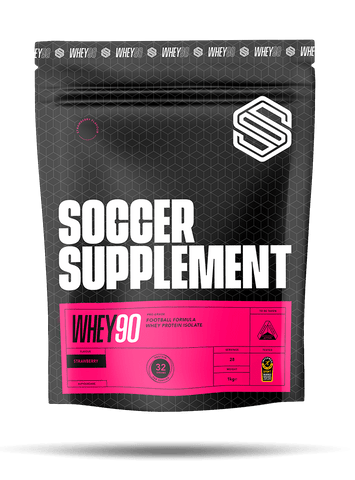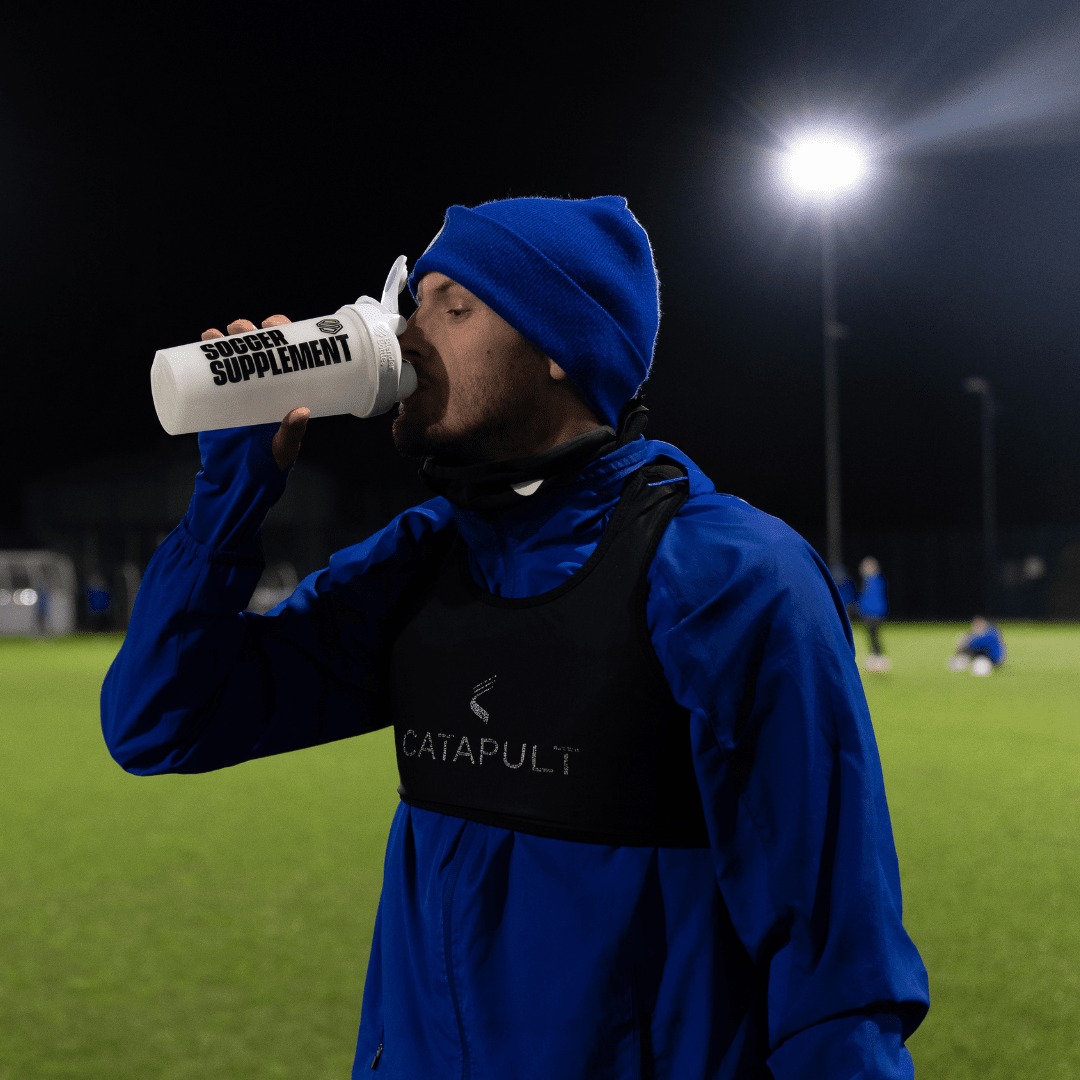Whether you’re a Sunday league player or Lionel Messi, ensuring that you eat the correct foods in the hours following a match or hard training session is essential for good recovery. When it comes to football nutrition, appropriate strategies to support your recovery are fundamental to your overall ability to consistently perform at a high level, whether during training or matches.
Given the physical demands of running, the aim of solid recovery nutrition would be threefold:
1. Rehydrate (fluids)
2. Replenish muscle glycogen (carbohydrates)
3. Repair damaged muscle tissue and promote exercise adaptation (protein)
As such, the following ‘top 5 foods’ are essential to good football nutrition and would be consumed with the aim of achieving one or more of these three aspects of recovery.
MILK
- Milk is nature’s answer to an all-in-one recovery product, with added calcium for good bone health to boot. Containing good quality protein and carbohydrates, milk is able to help you replenish muscle glycogen stores and repair damaged muscle tissue following training.
- Milk is also an excellent rehydration drink, with one study showing that it can replace water lost through sweat to a greater extent than Powerade or water.1
- Opt for around half a litre of whole milk after exercise (or semi-skimmed if weight loss is a goal). For the small percentage of people with lactose intolerance, ‘lactofree’ milk would offer the same benefits. If you really don’t like the taste of plain milk, flavoured varieties are also a great option.2
WHITE POTATO
- The white potato has taken a back seat in recent years due to the popularity of its sweet cousin. Despite the health halo surrounding sweet potatoes, white potatoes are typically higher in iron, magnesium, phosphorus, potassium, protein and selenium, though are lower in fibre, vitamin A, most B vitamins, calcium and manganese.
- With a glyceamic index of 85, white potato is quickly broken into glucose to be stored as glycogen (the storage form of carbohydrate) within the muscles.3,4
- Before the advent of gels and snack bars, it was no secret that top-level cyclists used to carry cooked potatoes with them on long rides.
WHEY PROTEIN
- The aim of a whey product would be to maximise rates of muscle protein synthesis throughout the day in order to repair damaged muscle tissue and promote exercise adaptation.
- Whey protein is one of the two proteins found in milk, with the other being casein protein. Given its cost-effectiveness and portability, it is a very convenient way to hit targeted daily protein goals. In addition to its convenience, whey consists of a high proportion of branched-chain amino acids (BCAA) and leucine (isolate: 25% BCAA & 12% leucine). Owing to its amino acid profile and rapid rate of digestion, whey protein results in a rapid increase in protein synthesis in comparison to whole food protein sources.5 Other beneficial properties of whey protein are its effects on reducing hunger and improving immune function.6 Contrary to popular belief, whey – or any other protein for that matter - does not harm the liver or kidneys.7
- Consume 25-35g of whey isolate soon after training for maximum benefit.
MIXED BERRIES
- Strawberries, blueberries, raspberries and blackberries are all good sources of vitamins, minerals and antioxidants, making them great for maintaining your immune system function after that taxing winter game.8
- Containing both glucose and fructose, mixed berries are ideal for restocking both muscle (glucose) and liver (fructose) glycogen levels.9
- Mix with natural yoghurt for a great carbohydrate-protein snack.
BEEF STEAK
- Similar to whey protein, the aim of eating a steak would be to maximise rates of muscle protein synthesis in order to repair damaged muscle tissue and promote exercise adaptation.
- Though not as quickly digested as whey protein, it does a very good job in achieving this goal.10
- Steak is also rich in iron, B-vitamins, zinc and taste; all of which are vital for endurance performance.
- Combine with potatoes for the ultimate recovery meal.
TAKE HOME MESSAGE
In order to take your recovery to the next level, remember the three R’s when planning your post-exercise nutrition:
- Rehydrate
- Replenish
- Repair
Soccer Supplement® covers all of these requirements with Recover90®, the all-in-one football nutrition solution for recovery.
Click here to shop our range of Recovery Supplements
References
1. Shirreffs, S. M., Watson, P. & Maughan, R. J. Milk as an effective post-exercise rehydration drink. Br. J. Nutr. 98, 173 (2007).
2. Karp, J. R. & Johnston, J. D. Chocolate milk as a post -exercise recovery aid. Int. J. Sport Nutr. Exerc. Metab. 16, 78–91 (2006).
3. Foster-Powell, K., Holt, S. & Brand-Miller, J. International table of glycemic index and glycemic load. Am. Soc. Clin. Nutr. 76, 5–56 (2002).
4. Donaldson, C. M., Perry, T. L. & Rose, M. C. Glycemic index and endurance performance. Int. J. Sport Nutr. Exerc. Metab. 20, 154–165 (2010).
5. Tang, J. E., Moore, D. R., Kujbida, G. W., Tarnopolsky, M. A. & Phillips, S. M. Ingestion of whey hydrolysate, casein, or soy protein isolate: effects on mixed muscle protein synthesis at rest and following resistance exercise in young men. J Appl Physiol 107, 987–992 (2009).
6. Rusu, D., Drouin, R., Pouliot, Y., Gauthier, S. & Poubelle, P. E. A bovine whey protein extract can enhance innate immunity by priming normal human blood neutrophils. J. Nutr. 139, 386–393 (2009).
7. Poortmans, J. R. & Dellalieux, O. Do regular high protein diets have potential health risks on kidney function in athletes? Int. J. Sport Nutr. Exerc. Metab. 10, 28–38 (2000).
8. Wintergerst, E. S., Maggini, S. & Hornig, D. H. Contribution of selected vitamins and trace elements to immune function. Ann. Nutr. Metab. 51, 301–323 (2007).
9. Décombaz, J. et al. Fructose and Galactose Enhance Post-Exercise Human Liver Glycogen Synthesis. Med. Sci. Sport. Exerc. 43, 1 (2011).
10. Phillips, S. M. et al. The impact of protein quality on the promotion of resistance exercise-induced changes in muscle mass. Nutr. Metab. (Lond). 13, 64 (2016).












